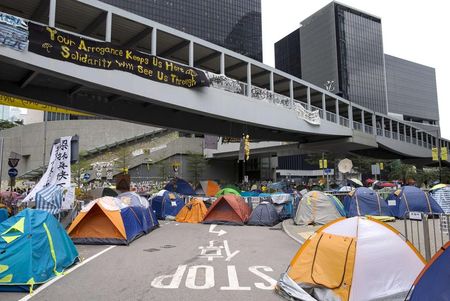HONG KONG (Reuters) - Three Hong Kong student leaders plan to take their fight for greater democracy to Beijing on Saturday as frustration grows over the city government's inability to negotiate on electoral reforms in the former British colony.
Protesters have occupied some of Chinese-controlled Hong Kong's most economically and politically important districts for more than six weeks in their demand for free elections in 2017.
Hong Kong Federation of Students leader Alex Chow said on Thursday he planned to travel to Beijing with fellow activists Eason Chung and Nathan Law and they hoped to meet Chinese Premier Li Keqiang.
Beijing has called the protests in Hong Kong illegal, as has the Hong Kong government, and there is no guarantee that it will allow the activists in.
Some Hong Kong business people have called for the protests to end, saying they are undermining confidence in the free-wheeling capitalist hub and could threaten stability.
Media said on Friday that police could start to clear the key protest sites on Monday or Tuesday. A lawyer representing two groups opposed to the protests said such a move could be delayed by one or two days because the wording of a legal document allowing the clearance was too vague.
China rules Hong Kong under a "one country, two systems" formula that accords the city a degree of autonomy and freedom not enjoyed in mainland China, with universal suffrage an eventual goal.
But Beijing said in August that only candidates screened by a nominating committee will be able to contest a full city-wide vote to choose the next chief executive in 2017.

At its peak, 100,000 protesters took to the streets. Those numbers have dwindled significantly, but a hardcore group of demonstrators, mostly students, has kept up the pressure on Hong Kong authorities.
(Reporting by Anne Marie Roantree, Diana Chan and Kinling Lo; Editing by Nick Macfie)
